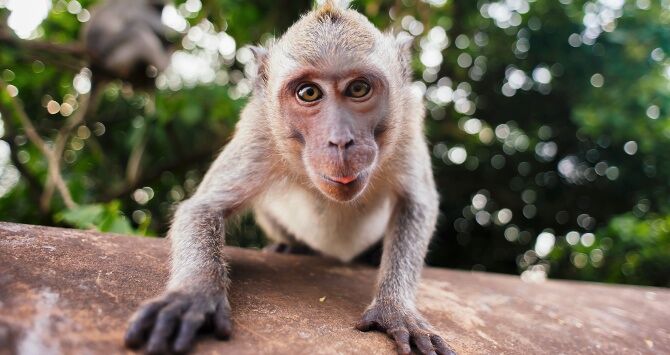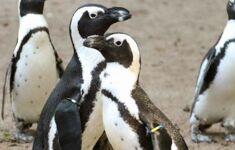
A new study says a large number of male macaque monkeys engage in homosexual activity. In fact, they’re more likely to engage in sexual behavior with other males than with females.
The scientists at Imperial College London are exploring the potential evolutionary benefits of same-sex sexual behavior. They studied a colony of macaque monkeys in Puerto Rico over three years. The results have just appeared in Nature Ecology and Evolution.
Many homophobes are fond of claiming that homosexuality is unnatural. In truth, same-sex sexual behavior and coupling have been observed in many different animal species. And it’s not just when there’s a lack of potential mates of the opposite sex.
This study looked at 236 males within a colony of 1,700 rhesus macaques living on one of Puerto Rico’s islands. Researchers recorded all the social mountings these male monkeys participated in. They also did genetic analysis and tracked their parentage and pedigree.
“We found most males were behaviorally bisexual”
The perhaps surprising result was that 72% of males engaged in same-sex mounting, in comparison with 46% for different-sex mounting.
“We found most males were behaviorally bisexual, and that variation in same-sex activity was heritable,” said the study’s lead author, Jackson Clive.
“This means that the behavior can have an evolutionary underpinning; for example, we also found that males that mounted each other were also more likely to back each other up in conflicts–perhaps this could be one of many social benefits to same-sex sexual activity.”
Having support and back-up from, well, friends-with-benefits, seems to benefit monkeys competing in a group for social status.
They also found, again perhaps surprisingly, that males that engaged in same-sex behavior (SSB) “may be more successful in reproducing, potentially due to the benefits provided by more coalitionary bonds.”
In terms of hereditary traits, they said that engaging in same-sex behavior seemed to correlate in the same way that other behaviors appear to have some hereditary aspects, such as grooming and sociality.
They observed that whether the monkeys were “mounters” or “mountees” (er, tops or bottoms), bore no correlation to their social standing in the group. In other words, it had little to do with them exerting dominance. Instead, there was a genetic correlation in the traits.
“Same-sex behaviour widespread amongst non-human animals”
The researchers said people should not be quick to draw comparisons between monkeys and humans, despite them being close relatives on the evolutionary tree. However, the study confounds the notion that same-sex behavior only occurs in humans.
Lead researcher Professor Vincent Savolainen, Director of the Georgina Mace Centre for the Living Planet at Imperial, said in a press release: “Unfortunately there is still a belief amongst some people that same-sex behavior is ‘unnatural,’ and some countries sadly still enforce the death penalty for homosexuality. Our research shows that same-sex behaviour is in fact widespread amongst non-human animals.
“Our mission is to advance scientific understanding of same-sex behavior, including exploring the benefits it brings to nature and within animal societies. Amongst the macaques we looked at in this study, more than two-thirds displayed same-sex behavior and this behavior strengthened the bonds within the community.”
Related:
Gay penguin couple steal eggs from lesbian birds in order to become dads
The wonders of nature!
Can dogs be gay? The surprising truth.
Dogs sometimes hump another dog of the same sex, but can dogs actually be gay? Click through to learn about homosexual behaviors in dogs and other species!





















Openminded
I’m not sure this is all good news. If it is scientifically determined that sexuality is genetic, I can hear the homophobes screaming that they now have proof that us “sexual deviates” should be eliminated to prevent the spread of homosexuality.
The bisexuality percentage doesn’t surprise me at all in the monkey group as I’m fairly sure it would be that way with humans if they would just live their true feelings.
still_onthemark
Eliminated? The first step would be they decide abortion is fine IF the precious innocent baby is going to turn out GAY. Btw, that was the premise of the 1993 play “Twilight of the Golds.”
dbmcvey
Homophobes will scream no matter what.
MacAdvisor
Going to slip in a movie recommendation here for Twilight of the Golds (1997). Directed by Ross Kagan Marks and based upon the play The Twilight of the Golds by Jonathan Tolins. The cast includes Jennifer Beals, Brendan Fraser, Garry Marshall, Faye Dunaway and Jon Tenney. The film deals with the issue of fictional genetic testing, and asks the question – if testing could reveal the sexual orientation of your unborn child, and you knew he or she would be gay, would you abort? Very well done.
Bosch
In this scenario, we’d also uncover that bisexuality is the most common configuration, exposing two things: heterosexuality is a minority, and the homophobes are probably not heterosexual.
basils_Herald
Sexuality is a complex trait and doesn’t live on any one gene and has about as much to do with the presence of the genes as it does there association/interrelation with one another. Other traits such as risk taking or the environment are factors as well.
Kangol2
Sounds like macaques are living out what ancient Spartans (and the fictional Amazons) grasped, which is the power of a same-sex army of lovers.
monty clift
“Many homophobes are fond of claiming that homosexuality is unnatural.“
They are also fond of arguing in bad faith. Even if you present the evidence that it is natural and observed in nature, they’ll say, “Well, we’re not animals; animals eat their own excrement too. Do you want us to eat our own crap as well?!” followed by some reference to a “slippery slope.” These energy vampires love moving the goalpost.